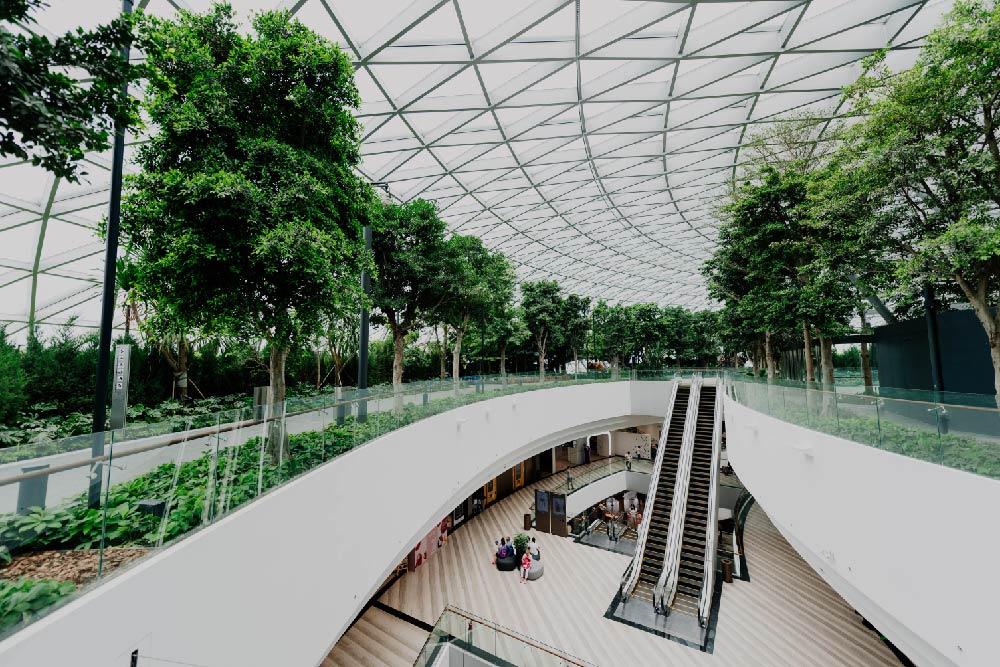
How Global Investors Are Viewing India’s Premium Real Estate
India is now the third most preferred global destination for real estate investment, with nearly $3.5 billion in foreign inflows recorded in the first half of 2024 alone (Fortune India). This surge reflects a decisive shift in global investor perception. Once considered an emerging bet, India now represents a structurally solid, strategically vital real estate destination, particularly in the office, warehousing, and high-end residential sectors.
This shift in the re-evaluation of the country’s real estate landscape is driven by multiple factors: global confidence in India’s economic resilience, the pace of urbanisation, expanding infrastructure pipelines, and a maturing regulatory framework that aligns better with international investor expectations.
Why India’s Premium Real Estate is Emerging as a Globally Trusted Investment Class
The data underscores one clear trend: global investors now view India’s premium real estate as a structural, long-term opportunity, not a cyclical or opportunistic play. Several macro and sector-specific fundamentals are reinforcing this confidence:
- Strong macroeconomic fundamentals: High GDP growth, urbanisation, and rising income levels are deepening real estate demand across sectors.
- Improved regulatory environment: RERA, GST, and REITs have made the Indian property market more transparent for investors.
- Diverse asset classes: From branded residences to Grade A office and warehousing, India offers a diversified investment asset class.
- Favourable demographics: A young, tech-savvy, aspirational population is supporting sustained end-user demand.
Together, these factors are positioning premium real estate in India as a long-term growth story with reliable income visibility, making it especially attractive for institutional and sovereign funds seeking stability, scale, and yield stability.
Foreign Capital Is Driving Institutional Investment Momentum
The growing institutionalisation of the Indian property market is one of the key drivers behind this capital influx. Institutional investments touched USD 1.0 billion in Q1 2024, with foreign capital accounting for 55% of these inflows (Economic Times).
What’s significant is the changing composition of this capital. While domestic investor participation has increased from 24% in Q1 2023 to 45% in Q1 2024, foreign funds remain the dominant force, driven by long-term confidence in India’s market fundamentals.
As this institutional capital takes shape, it is increasingly being directed towards high-yielding segments, most notably the commercial office sector and emerging urban growth hubs.
Office Sector and Emerging Cities Are Leading the Inflows
The office sector has been the biggest beneficiary of this renewed investor focus, accounting for 57% of total investments in Q1 2024 (USD 0.6 billion), with over two-thirds of this capital coming from foreign investors (Hindustan Times).
Cities like Hyderabad and Pune are emerging as standout performers, collectively attracting over 50% of investment inflows in Q1 2024. These top cities for real estate investment in India are drawing interest not just for their commercial office spaces, but also for high-growth industrial and warehousing segments, sectors now firmly on the global fund radar.
While commercial assets continue to anchor foreign capital, a parallel surge is underway in India’s luxury residential segment, driven by lifestyle shifts, global mobility, and the growing appeal of branded living.
Luxury Residential Real Estate Is Gaining Global Mindshare
With rising affluence among India’s HNIs and growing global mobility of NRIs, luxury homes are no longer viewed as secondary investments, they are evolving into primary global assets. This redefinition is drawing sustained foreign interest into branded residences, gated luxury enclaves, and premium high-rise developments across key urban centres.
NRIs accounted for nearly 15%-25 % of investments in newly launched residential projects across India’s top seven cities (The Hindu). This evolving buyer behaviour is also reflected in the rise of branded residences. The segment is projected to grow at 11–12% in 2025–26, reflecting deepening investor confidence (Business Standard).
Together, the momentum across commercial and residential segments highlights a clear investment direction. Capital is moving with purpose, towards assets with long-term value and proven fundamentals.
At Squarea, we combine global investor sensibilities with deep-rooted market intelligence. Whether you’re allocating institutional capital or expanding a private portfolio, we offer strategic guidance to ensure every investment decision is aligned with long-term performance.
To explore premium investment opportunities across India’s top-performing markets, connect with our team at hello@squarea.io or call +91 90 9641 9641.

The Role of Citizenship and Residency Programmes in Global Real Estate Investment
As real estate transforms into a truly global asset class, high-net-worth individuals (HNWIs) are increasingly looking beyond their home countries to diversify and protect their wealth. While capital appreciation and rental yields remain important drivers, today’s cross-border investors are equally motivated by the legal and lifestyle advantages tied to property purchases—especially the opportunity to obtain residency through investment.
Why Investment-Linked Citizenship Is Reshaping Global Real Estate Strategy
Known widely as “Golden Visa real estate,” citizenship and residency by investment programmes allow individuals to secure long-term residency or a second passport by making qualifying investments, often through real estate. For many HNWIs, these programmes are no longer peripheral—they have become core instruments in structuring a global real estate investment strategy, enabling international mobility and planning multi-generational succession.
In fact, 22% of global ultra-high-net-worth individuals now cite citizenship and residency access as a key driver behind international property investments, according to Knight Frank’s Wealth Report 2024. This data underscores a fundamental shift—real estate investment is no longer just about the property, but the strategic global access it can enable.
Key Advantages of Citizenship-Linked Real Estate Investments
Real estate today is not just about asset appreciation—it is a vehicle for global leverage. When aligned with residency-by-investment programmes, the investment becomes multidimensional, unlocking legal, financial, and lifestyle advantages. Here’s how:
- Secure ownership rights: Legal resident status simplifies title registration, inheritance, and dispute resolution—especially important in jurisdictions with layered regulatory frameworks.
- Unrestricted market access: Several countries limit or tax foreign ownership. Residency often removes these barriers, allowing access to high-performing markets.
- Better financing options: Residents and citizens qualify for improved mortgage terms, including higher LTVs and lower interest rates.
- Tax optimisation: Many such programmes are based in zero-tax jurisdictions, supporting long-term wealth preservation.
- Global mobility: : Visa-free or visa-on-arrival access to 100+ countries enhances business, education, and family planning.
- Access to premium services:Local legal status enables access to top-tier healthcare, education, and financial infrastructure.
- Geopolitical diversification:Legal residency supports risk mitigation through jurisdictional diversification.
Among the most attractive options globally, UAE real estate investment visa policies—especially in Dubai—stand out for their investor-friendly structure and alignment with capital preservation goals.
Dubai: A Case Study in Investment-Driven Residency
Among the most compelling examples globally is the United Arab Emirates, particularly Dubai. The city’s 10-year Golden Visa real estate programme—available to property investors with a minimum investment of AED 2 million—has attracted a growing wave of Indian and global HNWIs.
- Zero income and capital gains tax: Dubai offers a unique advantage—no personal income tax or capital gains tax. This maximises ROI and aligns with long-term portfolio preservation strategies.
- Full freehold ownership for all nationalities: Dubai allows 100% freehold ownership for foreign nationals across designated zones—removing typical restrictions faced in other markets.
- World-class healthcare and education: Residency through real estate unlocks access to globally ranked medical and academic institutions, making it ideal for families.
- Robust legal and regulatory ecosystem: Transparent property registration and investor protections make Dubai a secure environment for international buyers.
- Streamlined qualification: Projects are often structured to meet Golden Visa thresholds, making the Dubai property residency benefits both accessible and predictable.
This unique alignment between policy and real estate makes the UAE real estate investment visa programme a standout choice in the global HNWI landscape.
A Strategic Lever for Modern Investors
The role of citizenship and residency programmes in real estate is no longer secondary. They have become primary tools within a global real estate investment strategy—combining yield, legal benefits, mobility, and future security. For today’s global investors, aligning portfolio decisions with these programmes offers a powerful blend of diversification and resilience.
At SQUAREA, we help HNWIs and NRIs identify real estate opportunities that go beyond yield—assets that deliver legal advantages, mobility potential, and wealth preservation. Whether your goal is to invest in Dubai, expand into the UK, or tap into emerging hubs in Asia, our team ensures your property purchase is backed by legal insight and investment foresight.
Explore global investment opportunities that align with your citizenship and residency goals. Contact us at hello@squarea.io or call +91 90 9641 9641 to start your cross-border investment journey.

Cross-Border Real Estate Investments: Legal & Financial Factors to Know
In a globalised investment landscape, cross-border real estate has emerged as a reliable vehicle for wealth diversification. Increasingly, high-net-worth individuals (HNWIs) are looking beyond domestic markets to access more resilient currencies, stable rental yields, and stronger legal protections.
However, international property investment from India comes with a different set of rules, both financial and legal. Navigating these intricacies of international property acquisitions requires meticulous planning and informed decision-making.
To understand why global real estate for HNWIs continues to attract Indian investors, it’s essential to first examine the key drivers behind this growing appetite for cross-border investments.
The Appeal of International Real Estate
Indian UHNIs are rapidly expanding their investment horizons. According to Knight Frank’s The Wealth Report 2024, 32% of Indian UHNIs are considering property investments in global gateway cities (The Economic Times). This shift is not driven solely by returns—it reflects a broader strategy to diversify wealth.
While Indian luxury real estate continues to see strong domestic momentum, cross-border real estate investments offer distinct strategic advantages. These include
- Currency hedging: Holding assets in foreign currency mitigates INR depreciation and enhances portfolio stability.
- Geographic diversification: Allocating assets across developed markets such as the UK, UAE, Hong Kong, and Singapore spreads portfolio risk and unlocks new return profiles.
- Lifestyle and access: Properties in key locations often offer residency benefits, better infrastructure, or simply greater prestige and convenience for frequent travellers.
As this appetite grows, so does the need for informed planning. The next critical step for investors is to understand the legal and financial requirements for overseas property ownership.
Legal Considerations
Every international real estate market operates within its own set of legal frameworks, investment permissions, and ownership regulations. Understanding these frameworks is foundational for safeguarding both capital and ownership rights.
- Ownership restrictions: Not all jurisdictions offer full ownership to foreign investors. Dubai stands out as a favourable destination, offering 100% freehold rights to foreign nationals across designated zones, backed by a transparent regulatory regime and strong property laws (DAMAC).
- Property title and due diligence: It’s important to ensure the property has a clear title, appropriate land use permissions, and no legal encumbrances.
- Local compliance: Laws around Anti-Money Laundering (AML) disclosures, legal representation, and property registration differ widely. AML frameworks require the declaration of the source of funds and adherence to identity verification protocols.
- Dispute mechanisms: Being aware of the available legal remedies in the event of a dispute is equally important, including local courts and international arbitration frameworks.
Financial Considerations
A strong financial plan is essential when investing across borders. Even a high-yield property can lose its appeal if poorly structured. Here are the key financial elements you must assess:
- Purchase structuring: Whether you invest in your name, through an offshore company, or a trust can significantly impact taxation and succession.
- Loan eligibility: Some countries allow foreign nationals to secure mortgages, but interest rates, down payment requirements, and approvals can differ sharply.
- Tax implications: Understand how both countries handle property taxes, capital gains, and inheritance. Check if a Double Taxation Avoidance Agreement (DTAA) exists between India and the host country.
- Repatriation norms: : Ensure you’re allowed to bring back rental income or sales proceeds. For Indian investors, the Reserve Bank of India’s Liberalised Remittance Scheme (LRS) regulates this flow.
Countries with Favourable Frameworks for Indians
Some destinations are more accommodating to Indian investors due to longstanding economic ties or regulatory clarity. These include:
- UAE: No property tax, easy mortgage access, and long-term visa opportunities.
- UK: Freehold access for foreign buyers, strong legal protection, and DTAA benefits.
- Hong Kong: Transparent land ownership norms and attractive taxation policies.
- Singapore:High transparency and a stable regulatory environment, though with premium pricing.
Each market operates under its own set of legal and financial requirements for overseas property. Aligning your destination with your investment priorities—whether yield, capital growth, or lifestyle access—is key to making the right move.
Cross-border real estate, when approached with strategic clarity, can become a powerful extension of your wealth portfolio. From legal due diligence and tax structuring to market selection and risk planning, every aspect demands precision. With the right partners and a research-led approach, Indian HNWIs can unlock global opportunities with confidence and control.
At SQUAREA, we specialize in guiding investors through the intricacies of international property investment from India. Our team of experts provides tailored advice to ensure your investments align with your financial goals and comply with all legal requirements. For personalised assistance, contact us at hello@squarea.io or call +91 90 9641 9641. Let’s explore global real estate for HNWIs together!


